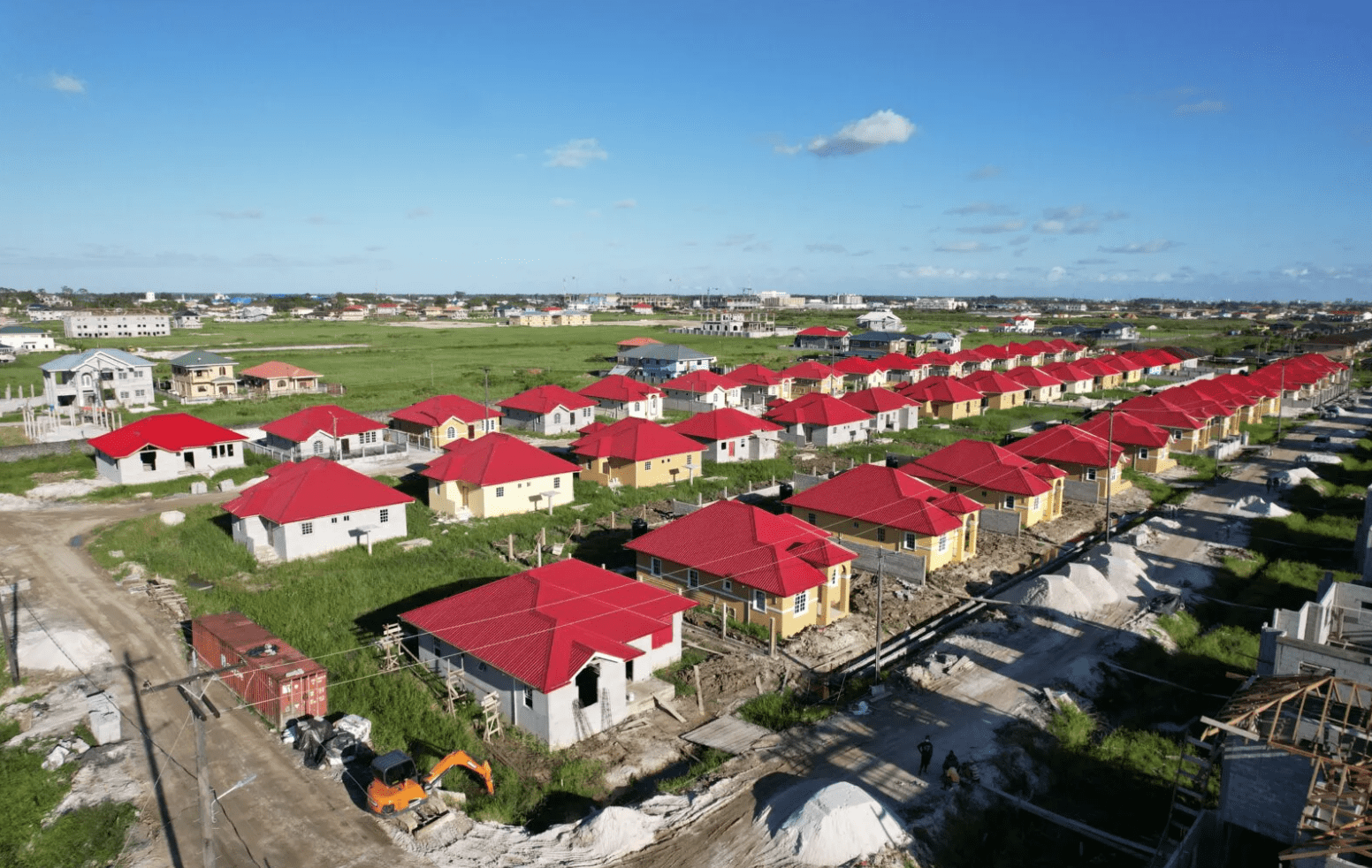Like the economy’s developmental trajectory, the Real Estate sector in Guyana has outpaced expectations since the discovery of oil & gas resources in 2015. This momentous find led to a rise in Real Estate prices due to the influx of foreign investors and workers in the country. This created a demand for commercial spaces and housing, particularly in the capital city of Georgetown.
With residential Real Estate dominating the market at a projected value of US$16.81 billion this year, Guyana’s overall Real Estate market is expected to reach a value of US$25.5 billion in 2024. Further, an anticipated compound annual growth rate (CAGR) of 4.86% is projected for the period 2024 to 2029. This will increase the CAGR of US$25.5 billion to US$32.36 billion over the five-year period. This is according to Statista’s Market Insights on the Real Estate market in Guyana.
While the numbers attest to the influx of finance in the economy, insight from key stakeholders involved in the sector paint a clearer picture of the impacts this is having on local players.
Laboratory Science university graduate Keyola McQueen who was approximately three months into becoming a tenant at the time of this interview, has been on the hunt for a home for almost one year. Sharing the details of that journey, she highlighted her main challenge to be budgeting.
“So, it would have been me transitioning from university to that working environment and trying to facilitate working with the expenses that would be within my regular day to day, alongside now having to pay rent,” she said.
McQueen, who prioritises safety when choosing a place to live, agrees that the cost of rent has significantly increased as she shared a comparison from personal experience.
She said, “I definitely agree that it has skyrocketed because, during my university years when I first considered to move, to relocate, that was the first thing that would have been a consideration. Within the evolved time, expenses have gone off the charts. Some places that I would have known previously would have been about GYD$30,000 to rent are now about GYD$45,000 to GYD$50,000.”
Expressing her hopes of not being a tenant for longer than 10 years, McQueen endorsed the young professional home initiative by the Government of Guyana through the Ministry of Housing and Water. Although the initiative is commendable, she indicated that there exist challenges securing a home of that nature.
“They would have started the initiative of the young professional housing facility, yet still it is difficult to acquire that. So, we are left with having to either seek help from a friend, stay by your family or in many cases, having to find somewhere to rent,” she pointed out.
She suggested a similar initiative to assist those who are left to seek housing through renting, saying, “They should try to, if not facilitate renting facilities, they should either have some control over a renting standard.”
Further, McQueen explained that she would get onboard if the government decided to create renting facilities of good standard and affordable cost for persons with no other option than to rent. This would be especially helpful since she has already heard that the cost of her rent is likely to increase.
“Indeed, I would have recently moved in a few months ago here, yet still I’m already hearing that at the end of the year how much it’s going to increase by. So, I have to already start adjusting to facilitate that or start looking for a new place within my budget,” she stated.
McQueen’s advice to persons hunting for housing to rent is that they should prioritise saving since some landlords require first and last month’s rent along with a security deposit. To many, this may come as a shock and is often not budgeted for.

Requesting anonymity, another tenant, renting for nine years shared their experiences from 2015 since the oil discovery to the 2024 oil boom.
Reciting the figures, they explained that from 2015 to present, they have experienced a 66.67% increase in their rent. Additionally, they said that the quality of the properties does not match the cost.
“For instance, I used to pay GY$75,000, now I’m paying GY$125,000. And the place I was paying GY$75,000 was better than the place I’m paying GY$125,000 presently,” they said.
On that note, the tenant explained that rent for the property they initially resided at increased by at least 166.67% in 2024.
“If I go back to that place now, that I paid GY$75,000 in 2015, it’s like GY$200,000 or more now,” they said.
While sharing that they too prioritised security when choosing an area to reside, the tenant highlighted some of the challenges they have faced in tenancy throughout the years.
“And they know that this space can only accommodate two bedrooms comfortably, they would still try to put three bedrooms to raise the rent. So, you have two small bedrooms and one decent sized bedroom. Another thing they would do is install an air conditioning unit, then increase the rent by GY$16,000.” the tenant explained.
The tenant expressed that they are, more times than not, frustrated about their living situation since the amount paid on rent surpasses that of a monthly mortgage instalment.
On the other end of the spectrum, the professionals in the sector with the responsibility of marketing and management are keen visionaries for government implemented policies that can subsidise building materials and lend further support for expansion to the growing sector.
A pioneer in Real Estate and Property Management hailing from the mining town of Linden is 33-year-old Enzo Matthews. He is the proprietor of Lezo Vacations, with approximately 10 years of experience in the sector. Emerging as one of the first companies in Guyana to host on Airbnb, he continues to blaze the trail with expansions that now accommodate over 40 rooms throughout the East Coast of Demerara, the capital city of Georgetown and the East Bank of Demerara. At a young age, Matthews noticed the importance and value of properties. This led him to commence his Real Estate journey in 2012 at just 21 years old.
Although it has been thus far a compelling journey, his main challenge remains.
“Most of the challenges still remain the same. Access to capital, that’s number one on the list,” he said.
Speaking on the effects the oil boom has had on the sector, Matthews indicated that his company has experienced minimal effects.
He said, “So honestly, we have not seen much impact on our real estate business. Reason being, most of the persons that came to Guyana, the first thing they wanted to do was to regularise our properties. Everyone that came, asked for huge discounts, they had a long list. Sometimes the list was a bit too long.”
Matthews believes that companies that came to Guyana to operate in the sector exploited the market causing prices to skyrocket. Now, no one is paying those prices. “The persons who came to Guyana took advantage of the Real Estate market. They knew that we were not able to supply certain things. Armed security, barbwire, security cameras, Wi-Fi, water, washer and dryer, all of these things. I would say that they abused the market when they came in. If you look on the internet you can find [properties for over US$4,000] but there is nobody to rent them.”
Matthews has affirmed that he does not plan to regularise his properties to cater to expats but instead caters to anyone who is looking for an apartment. Since the costs are already high for locals. Despite this, Lezo Vacations has capitalised on the International Building Expo which has emerged due to the oil & gas operations in Guyana. “An educational opportunity for future builds” is how he describes the annual event.
Regarding challenges, Matthews suggested that the government should subsidise transportation of material and equipment since the inaccessibility of sand and stone has become a bugbear.

“Sand and stone are always hard to get. I’m not sure what the issue is. So, I think some subsidy should be put towards the transportation aspect of these raw materials. Maybe lower taxes on trucks so that more persons are able to purchase them. They can even be put as duty free vehicles, but a mandate must be in place so that the cost for these things is regularised by the government.” He explained.
With eight years of experience as a Real Estate Agent, beginning her journey in 2013 at 19 years old, Charlyn Miller is an Agent with a driving passion. Although she took time away to complete her studies at the university, nothing has deterred her from the love she has for helping families to find the perfect home. Just two years after becoming an Agent, she established her own Real Estate and property management company; Listing in Guyana.
Miller noticed a significant change in the market while she was away. Clients were requesting properties at prices that were no longer on the market. This she said is even clearer now.
“Persons were requesting low priced properties for rent. However, there weren’t any around that, that were available because there was an influx in the market where prices had begun to go high and persons looking for a GY$35,000 rental was no longer available. Which is evident right now. It is almost impossible to find a GY$35,000 rental which was possible a few years ago. Even to find a two-bedroom house in decent condition for GY$50,000 is most likely impossible.”
Miller explained that she finds it hard to grasp the price hike at times. For her, it is a passion to find the right home for families. Now, it seems like only select families would be able to purchase a home or even land.
“And now it’s kind of giving me a challenge to wrap my head around prices. An example I will give is with land. Land on the lower East Bank [of Demerara] a couple years ago was GY$4 million or GY$3.5 million. Land currently is GY$7.5 million and up. And that is the most significant thing I can say happened in the real Estate sector over the past eight years.”
Miller associates that change in the market to the influx of expats that has flooded Guyana due to the oil and gas operations. Her concerns are deeply rooted in the fact that locals are struggling to find affordable housing.
“The influx of expats and foreigners, the different companies bringing their workers here, but they can afford the rent, you know, has been inflated. They can afford it, but the local Guyanese cannot afford it. And the thing is, people are being able to rent their places at those prices because we have a lot of foreigners here and they can afford it.
Miller further divulged that the cost of owning a good home has increased by more than 50%.

“South Ruimveldt is becoming a much better area because it was always good, but due to development of the new roads, the prices have gone up. That’s an example of an area where you probably could have gotten a house for GY$20-25 million. Now the prices are very high. To get a good home right now it’s over GY$30 million,” Miller explained.
Joining the sector in January 2020 was Real Estate Agent Kamau Layne. Two years later, he established Opulent Realty. A company with heavy focus on the expatriate community in Guyana.
Layne’s view on the Real Estate sector is quite optimistic as he believes it has been creating more benefits for Guyanese.
“As an agent, I think the oil and gas sector isn’t going anywhere for now. The long-term effect: what I find is that a lot of people really benefit from the market because you find now that more people are into apartments, a lot of people are more into tracking the Real Estate market and investing. So, its long-term effect is, it’s going to benefit more Guyanese as I see it.”
The market’s continued growth rate is fuelled by the expanding interest of locals to get involved in the sector by modifying their space to place it on the market.
“There’s a lot of people that are getting into apartments to cater for this sector. I’d just like to emphasise that the real estate market is growing, and it will only keep growing, and the oil and gas sector is a major influence,” he said. “There’re lots of opportunities in the real estate field. Not only for agents but also for owners (property owners). So, I’d always advise [people] to capitalise on it. You don’t have to cater to oil and gas, but the real estate market in itself has lots of opportunities for property owners to benefit from,” he said.
The International Building Expo which the three companies participated in, has seen yet another successful runoff this year. Minister of Housing and Water, Colin Croal, in his opening message at the expo announced that hefty investments are underway in the real estate sector aimed at supporting the growing housing demands in Guyana. These demands will stimulate job creation which will further benefit Guyanese and reduce poverty.

“The housing sector is an important driver of our country’s economy, poverty reduction and development. It is rapidly changing the face of our country and the circumstances of our people,” Croal said. “Housing construction stimulates employment and galvanises business activities. This is why our government is investing some GY$78 billion this year to escalate the establishment and upgrade of housing schemes and the construction of more houses catering for all income categories.”
Guyana’s oil resources were discovered in May 2015 when ExxonMobil announced a significant find at the Liza-1 well in the Stabroek Block. Production operations commenced in December 2019 and now exceeds 600,000 barrels per day.



